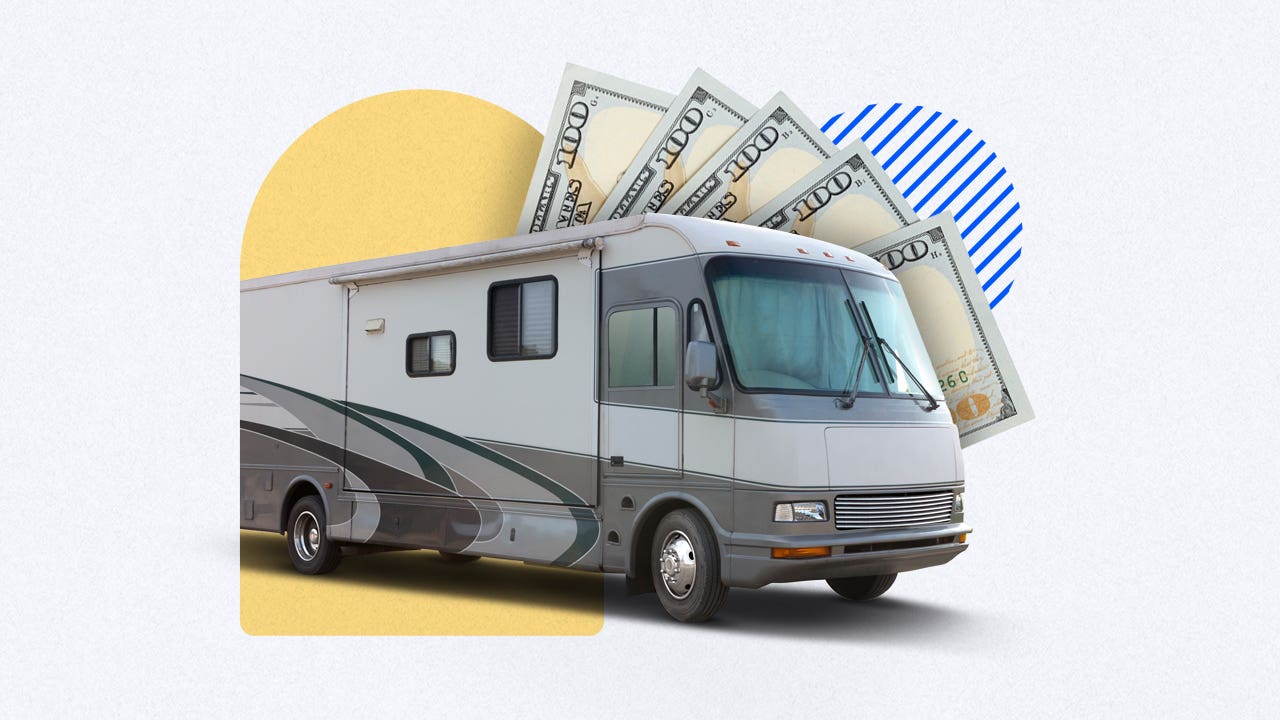How to choose the best RV loan lender for you

Key takeaways
- When gauging approval, RV lenders consider your credit score, income and debt-to-income ratio (DTI), among other factors.
- Get prequalified with multiple lenders and compare potential offers before applying.
- Find a lender that offers the amount you need at a competitive rate to make the most of your RV financing.
If you’re like most buyers, you will need to finance your recreational vehicle with an RV loan. When comparing your options, prequalify for a personal loan to find the most competitive RV loan rates and terms. Take each lender’s requirements into account, then run the numbers for your monthly payment and total cost to be sure you’re getting the best deal.
What to consider before choosing an RV lender
It may be harder to get an RV loan because the amount is much larger than other loan types, depending on the model you want and your down payment amount. Typical RV loan terms last five to 15 years, meaning the payment will be part of your monthly budget for the long haul.
To choose the best financing for your RV, conduct thorough research to find both the most competitive rates and terms. Also consider factors like whether you want a secured loan and the level of customer service you expect.
Decide on a secured vs. unsecured loan
Lenders offer either secured or unsecured loans. Make sure the lenders you consider offer the loan type you prefer.
Secured
- Your RV serves as collateral
- Lower interest rates
- Offered through dealerships
- Will lose your RV if you default
Unsecured
- Fewer restrictions
- Higher interest rates
- Offered through personal lenders
- Will not lose your RV if you default
Check the requirements for RV financing
To get an RV loan, you’ll need to meet the lender’s eligibility requirements. Each lender sets its own, but most will consider your:
- Credit score, usually a FICO score of 670 or better
- Income
- DTI ratio under 36%
The better your credit score, the lower your interest rate will generally be. While bad credit loans exist, these often come with less flexible repayment terms and high interest rates.
Some lenders don’t extend loans to those who plan to use the RV as a primary residence. If you plan on living in your RV full-time, check with your lender to make sure you still qualify.
Find what interest rates you prequalify for
The lowest interest rates disclosed on the lender’s website aren’t guaranteed. Before choosing a lender because of a particularly low annual percentage rate (APR), be sure to prequalify to see your potential rate. Keep in mind that the lowest APR is reserved for the most creditworthy borrowers.
Also, ensure that the interest rate ranges disclosed aren’t promotional or for a set amount of time. Make sure you understand every cost associated with the loan. Look for additional costs like origination fees, late fees and prepayment penalties.
Lenders have different fee structures, often based on credit. To better understand rates and fees you could be offered, read the lender’s terms and conditions page or call a customer service representative.
Think about your loan amount
Before comparing the best RV lenders, it’s important to know how much money you will need to purchase your RV. Recreational vehicles can vary widely in cost, ranging anywhere from $10,000 to $1 million. Most lenders limit what you can borrow, often approving $100,000 personal loans or less, so keep that in mind when setting your budget.
While you can borrow enough to fund future RV expenses, it’s better to budget for them in advance rather than fund them with a loan that you will pay interest on. Be sure to budget for:
- Maintenance costs
- Storage fees
- Upgrades
- Insurance
- Fuel
- Campsite fees
- RV taxes (depending on your state)
If financing and paying for future maintenance on an RV would overwhelm your budget, or you find you use it only occasionally, consider renting an RV instead.
Understand your repayment options
The repayment terms you agree to will affect how much your monthly payment impacts your budget — and for how long. Longer repayment terms will mean a lower monthly cost, whereas a shorter repayment period will likely increase your monthly expenses.
A shorter term, despite the higher monthly payment, means that you’ll pay less interest over the loan’s life, allowing you to own the RV sooner. You can use a personal loan calculator to estimate your monthly payment and long-term cost of owning an RV to get a better idea before you buy.
Research customer experience
Depending on your comfort with technology, you might prefer to work with a brick-and-mortar lender with in-person support. If you like to handle your finances online, focus on online loan options.
Customer reviews on third-party websites like Trustpilot may also be useful. For most people, it may make sense to prequalify with a variety of lenders to decide which one works best for your needs and budget.
Consider perks and special features
When evaluating similar lenders, look out for unique features that may be offered. Here are a few questions to get you started:
- Does the lender restrict what kind or age of RV you can fund with its loans?
- Are there discounts, special programs or other forms of assistance available?
- Do the benefits outweigh the borrowing costs or vice versa?
Ultimately, you know how much loan you can afford and which RV financing options will work for you. Be sure to compare loan quotes and run the numbers to confirm loan perks aren’t being offered at the expense of a good price.
How to get the best RV loan
You should keep your budget, credit score and lender options in mind when searching for the best RV loan. While there will never be a one-size-fits-all option, you may be able to find a loan that suits your budget and needs with a little extra research.
- Budget: Your current debts and income will play a major role in your budget. When determining how much you can afford, use a personal loan calculator. Be sure to keep in mind how fees might impact your upfront and long-term costs.
- Understand your credit score: Take the time to check your credit score. This way, you can search for and apply to lenders that best match your credit background.
- Apply for prequalification: By prequalifying with at least three lenders, you will have a firm grasp on expected rates and terms — all without damaging your credit. Not all lenders offer prequalification, but take advantage of this option with the ones that do.
- Compare loan options: Consider borrowing from banks, credit unions and online lenders — but don’t discount dealership financing for larger, more expensive models. Be sure to compare the terms of each option to find the best RV loans for your needs.
- Formally apply: Once you find the right lender, be prepared to provide a few required documents for a personal loan, which include personal, financial and tax information to make the application process as smooth as possible.
You can start your search for an RV loan with some of the top RV loan lenders:
- LightStream, Bankrate’s choice for best overall RV loan
- Prosper, the 2025 Bankrate award winner for Best for Borrowers with Good Credit
- SoFi, a 2025 Bankrate award winner for Best Online Lender
Bottom line
Choosing the right lender is the first step toward getting out on the open road. To ensure you can enjoy your RV for years to come, pay close attention to details like approval requirements, interest rates, loan amounts, terms, customer service and special features.
To confidently select the best RV lender for you, understand your payment obligations and total loan costs. Shop around, get prequalified with multiple lenders and then compare the loan quotes.
Why we ask for feedback Your feedback helps us improve our content and services. It takes less than a minute to complete.
Your responses are anonymous and will only be used for improving our website.
You may also like

How to apply for a fast business loan

Personal loan vs. home equity loan: Which is better?

Best reverse mortgage lenders in 2025

How to choose a mortgage lender: 5 tips



